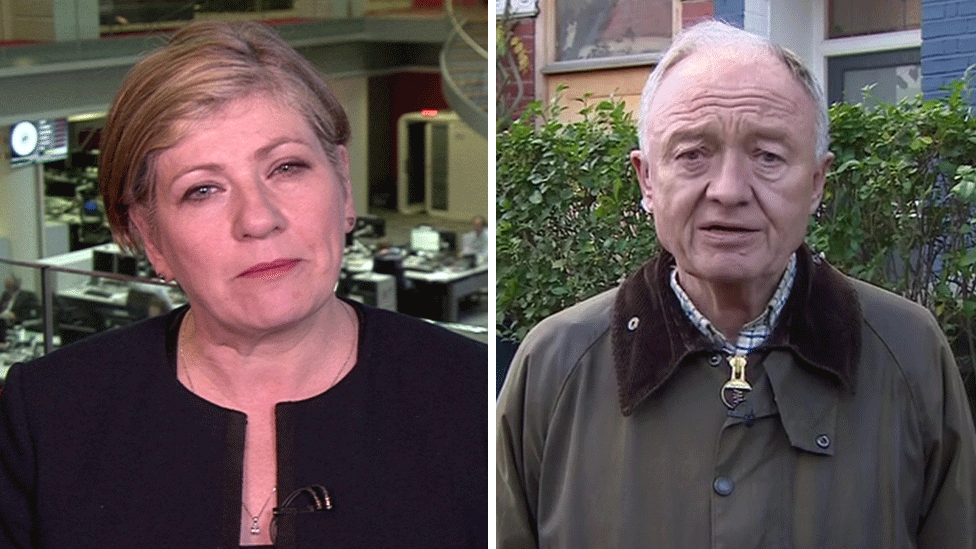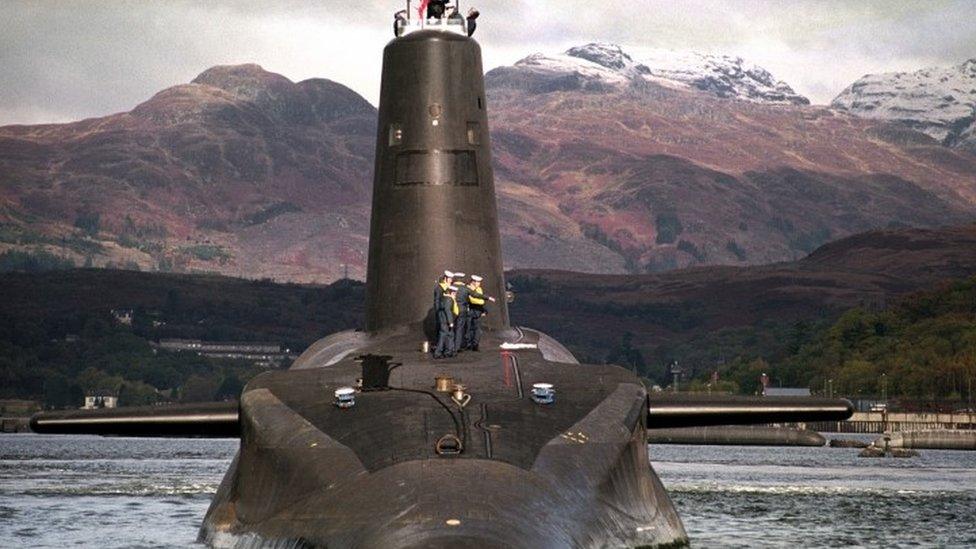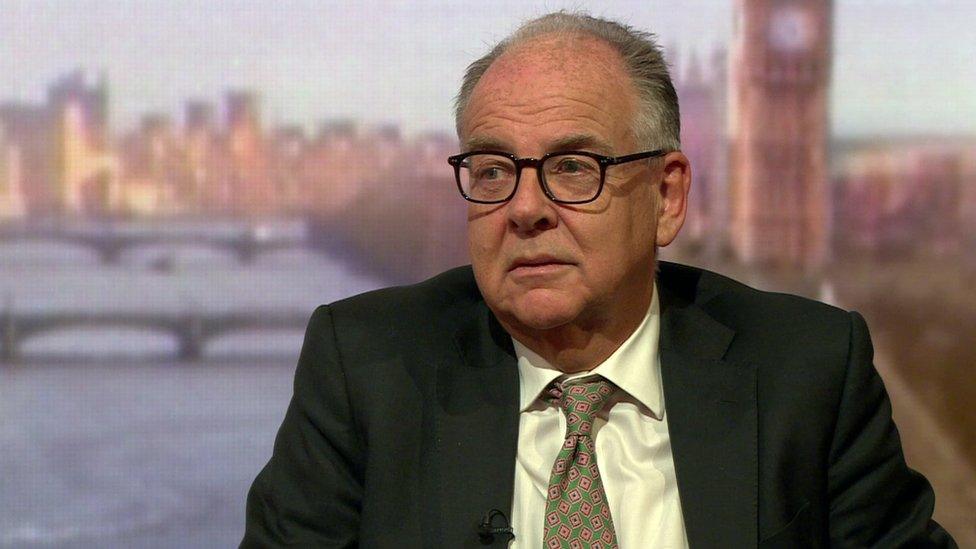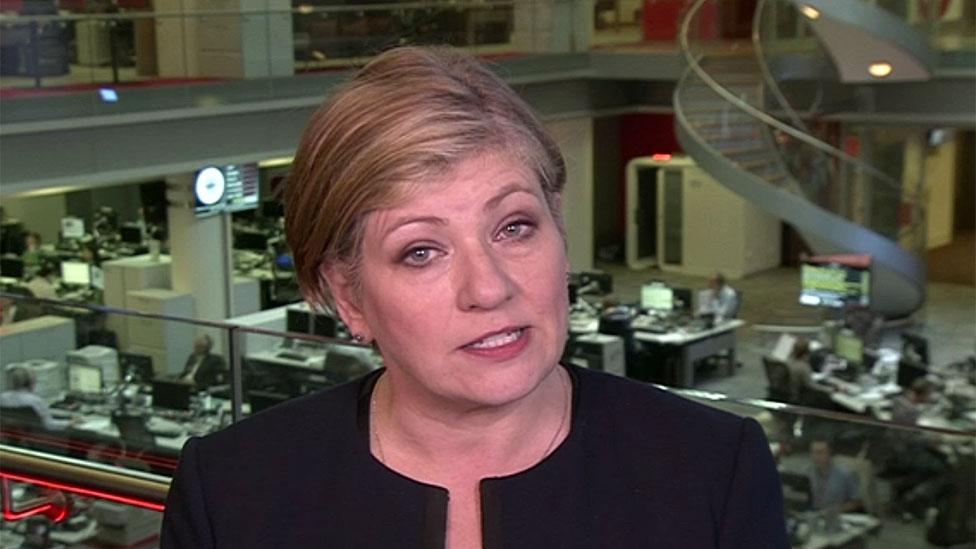Livingstone won't have 'formal role' in Labour defence review
- Published

It had been reported that Mr Livingstone would be co-convenor of the review
The BBC understands Ken Livingstone will not have a formal role on Labour's defence review, which will consider the party's stance on Trident.
The review, to be led by shadow defence secretary Emily Thornberry, will feed into a wider review on the UK's global role that Mr Livingstone will chair.
Ms Thornberry said the defence element would be "based on the evidence" and take into account differing views.
She said she was aiming to publish an interim report by June.
Is Ken Livingstone still part of Emily Thornberry's defence review for Labour?
This would enable Labour's National Policy Forum to consider policy on Trident prior to the party conference in September - at which party members could vote to overturn decades of support for nuclear weapons.
The BBC's Carole Walker said it had been assumed that Mr Livingstone would play a leading role in the review of Labour's policy on whether to renew Britain's nuclear weapons.
'Complete agreement'
The former Mayor of London said he was "happy" with the part he was playing and said he and Ms Thornberry - who became defence spokeswoman in a reshuffle earlier this month - were in "complete agreement" on the issue.
Mr Livingstone and Ms Thornberry are opposed to the UK's nuclear weapon system as is Jeremy Corbyn but many Labour MPs support it.
Labour's official policy since the late 1980s has been to keep Trident but supporters of Mr Corbyn want to change it at the party conference later this year, arguing that weapons will never be used and its multibillion pound cost cannot be justified.

Labour has backed the Trident nuclear weapons system for more than 30 years
The Labour leader has promised to give party members a say over the decision.
However, this could prompt a backlash from senior MPs - including several members of the shadow cabinet - who believe a nuclear deterrent is essential to the UK's national security and place in the world.
Mr Livingstone's involvement in the process has provoked criticism from some Labour MPs as he has been highly critical of supporters of Trident in the party and has not held elected office since stepping down as Mayor of London in 2008.
'Respect and trust'
Setting out the terms of reference for the review, Ms Thornberry said it would examine the "whole range of defence challenges", not merely Trident, and how best to respond to the threats facing the British people.
It is expected there will be public meetings and seminars as part of the efforts to gather evidence from academics, military personnel, families, party members and other interested parties.

Timetable of Labour defence review
30th April: Deadline for initial contributions
June: Interim review could be published
11-15 July: Unite policy conference
July: Summer meeting of the National Policy Forum
25-28 September: Labour's annual party conference

"This will be a comprehensive review of Britain's defence challenges and options for the 21st century," she said. "It will be open, transparent and inclusive, and its conclusions will be based on the evidence.
"At every stage of the process, we will give full scope to the wide range of views on this subject in an atmosphere of mutual respect and trust."
While she would approach the review with an "open mind," she said she was "extremely sceptical" about the grounds for retaining Trident and would "not be afraid to ask some really difficult questions".
She insisted the review "would take as long as it takes" but that, if need be, would publish interim findings to "feed" into discussions at the National Policy Forum, expected to take place in July.
'Strong case'
The BBC's political correspondent Carole Walker said there was no intention to prioritise or separate Trident policy from the wider defence review.
Ms Thornberry's review of the party's defence policy will feed into a wider review of Labour's foreign policy on which Mr Livingstone will be co-convenor along with the shadow foreign secretary Hilary Benn. Work has yet to start on the wider policy review on Britain in the World.
MPs will vote at some point this year on whether to proceed with the building of a new generation of Vanguard nuclear submarines, to replace the existing fleet which will become obsolete by the end of the 2020s.
Former Labour defence minister, Lord West, said he would quit the party if it decided not to support Trident, telling Daily Politics the "British public believe in the deterrent" and a policy of unilateralism would be "disastrous".
And the head of the Unite union, Len McCluskey, said it would be making a "very strong case" to Labour about the role Trident played in supporting jobs in communities across the UK.
"Our members will be reassured by the scope and calendar of this review because it is evidently designed to ensure that all voices are heard in this important process," he said.
- Published10 January 2016

- Published6 January 2016

- Published6 January 2016
